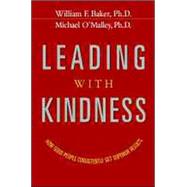
Note: Supplemental materials are not guaranteed with Rental or Used book purchases.
Purchase Benefits
What is included with this book?
William F. Baker (New York, NY) is Chief Executive Officer of Educational Broadcasting Corp (Thirteen/WNET and WL1W21). He is Executive in Residence at Columbia University Business School, and University Professor at Fordham.
Michael O'Malley (Hamden, CT) is Executive Editor for Business, Economics, and Law at Yale University Press, and adjunct professor at Columbia University Business School.
| Foreword | p. ix |
| Preface | p. xiii |
| Introduction | p. 1 |
| What Kind Leaders Do | p. 11 |
| Who Kind Leaders Are | p. 37 |
| Expectations Matter | p. 77 |
| The Truth Matters | p. 119 |
| Growth Matters | p. 155 |
| Preparing the Next Generation of Leaders | p. 193 |
| Appendix | p. 217 |
| Index | p. 229 |
| About the Authors | p. 237 |
| Table of Contents provided by Ingram. All Rights Reserved. |
The New copy of this book will include any supplemental materials advertised. Please check the title of the book to determine if it should include any access cards, study guides, lab manuals, CDs, etc.
The Used, Rental and eBook copies of this book are not guaranteed to include any supplemental materials. Typically, only the book itself is included. This is true even if the title states it includes any access cards, study guides, lab manuals, CDs, etc.